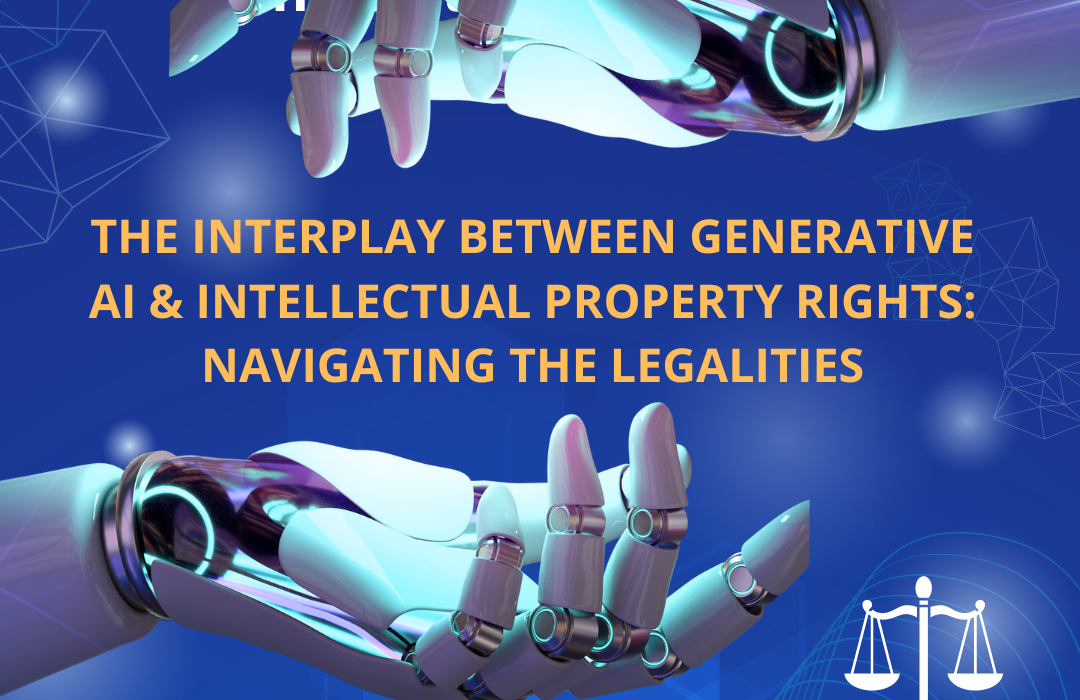THE INTERPLAY BETWEEN GENERATIVE AI & INTELLECTUAL PROPERTY RIGHTS: NAVIGATING THE LEGALITIES
Introduction
If we talk about innovation in the recent years, Artificial Intelligence (AI) is perhaps the first thing that comes to mind. It is revolutionising traditional practices and models in real time, and is truly a disruptor in every sense. With the ever expanding presence of generative AI bots like Chat GPT, Gemini, and Meta AI, one can get human-like answers to their queries in a matter of seconds. Science, arts, business, and every imaginable field has been impacted by AI to at least some extent. Similarly, law, particularly the domain of intellectual property rights has also been significantly impacted by the rise of artificial intelligence. This article is an attempt to understand the interplay between AI and IPR, and how various jurisdictions across the world have reacted to the same, by way of legislative enactments.
The Interplay between AI & Intellectual Property
AI has been making waves in the intellectual property landscape for quite some time now. While it gives rise to a host of opportunities, it is plagued by multiple challenges at the same time; especially in terms of the protection and ownership of AI generated content and potential legal and ethical issues such as copyright infringement, patentability, and data protection.
In the traditional landscape, ownership is attributed to the human who is in charge of creating or inventing the new commodity. However, complexities are bound to creep up when AI comes into play, since the question of ownership becomes unclear. Legislators of most countries are yet to address this issue, with there being no clarity as to whether the creation should be credited to the AI bot itself, or the person/ organization in charge of the said bot.
Moreover, another aspect that throws a wrench in the entire situation is the potential infringement of material which is used to “train” AI bots. As you must be aware, AI bots generate responses, sometimes rather elaborate and human-like, based on the information inputted by humans in the form of questions or prompts. But how exactly are the bots trained to do so? To answer this question, the developers and/ or programmers expose the bot to a variety of information in multiple forms such as images, audio-visuals, and texts to “train” it. However, a lot of the material in question is copyrighted, which brings another question to the surface: “What about the copyright infringement of this information? Will legal action ensue?” While most countries, through their laws, stipulate that an inventor has to be a human being, this question remains largely unanswered.
Another concern that needs urgent attention is the intersection of data protection and artificial intelligence. While AI gives rise to multiple possibilities and opportunities, privacy concerns simply cannot be ignored. Hence, it becomes important for businesses to implement effective data protection policies which are compliant with the laws of the land. But how have countries tackled this problem? Let’s take a look.
How are Countries Reacting to these Developments?
As the use of AI grows rapidly with each passing day, lawyers and legislators from across the world are calling for the same to be regulated in order to avoid legal and ethical dilemmas. However, the situation needs to be tackled with tact, and in a way that does not stifle innovation and creativity, while also protecting the interests of the public at large. Let’s take a look at steps taken by some nations in this light:
- The European Union
The EU cemented its world leader status by being one of the first to propose a legislation on artificial intelligence. Proposed in 2021, the AI Act is the first legislation of its kind, and came into force on 1st August 2024. It will be fully implemented within the next two years, and provides AI developers with clear guidelines and specifications in terms of use of AI. Simply put, it can be termed as a policy measure to safeguard individuals and businesses in the Union in terms of AI; while simultaneously fostering AI innovation and investment. The framework categorises the risk into four levels, namely minimal risk, limited risk, high risk, and unacceptable risk. Their use will be regulated, or even prohibited, based on the risk level and implications on the general public. However, it is noteworthy that there is no clarity on how this will affect intellectual property.
- The United States of America
Though prominent American figures like Space X CEO Elon Musk, and Stephen Hawking have called for the regulation of artificial intelligence technology to uphold ethics, there is no federal legislation governing the use of, or prohibition on certain AI technologies in the United States. However, there are several proposed legislations to regulate the use of AI at several levels, such as political advertisements, employment, and media & entertainment. American law states that patent invention and copyright do not extend to AI. The United States Patent & Trademark Office (USPTO) held that inventions can be conceived only by a “natural person.” Similarly, it was held that human authorship is required for copyright protection. It is noteworthy that several states have introduced AI related bills recently, with the state of Colorado enacting the first state level AI law in the form of the Colorado AI Act in May 2024. If anything, it will be intriguing to observe the development of federal AI laws in USA, and their subsequent impact on intellectual property rights.
- China
In August 2023, China’s first AI regulation named ‘Interim Measures for the Management of Artificial Intelligence Services’ came into effect. Backed by the Cyberspace Administration of China, it puts forth a variety of measures to enhance generative AI technology, while simultaneously establishing standard norms for generative AI service providers. The implications on intellectual property have also been given due regard, with companies engaged in the creation of generative AI obligated to enact safeguards not just to ensure compliance with the laws, but also to ensure due protection of intellectual property. While these laws do not take up a sector-specific approach, certain sectors like healthcare, financial, and automobile have in place sector-specific regulations governing the use of AI. This law also extends to training data rules, wherein one of the pre-requisites is that the content used for data training should not result in the infringement of third-party intellectual property rights, and that it should be in accordance with laws. This law is applicable across the People’s Republic of China, excluding Hong Kong SAR, Macau, and Taiwan.
On the other hand, countries like The UK do not intend to enact laws to regulate AI, which was made clear upon the publication of the government’s AI Regulation White Paper. The reasoning behind this was the rapid development and uncertainty surrounding AI technology. However,the enactment of a principle-based framework for existing regulators to carefully consider the use of AI technologies in their respective sectors, and their impact on human rights, safety, security, fairness, and privacy might be on the horizon sooner than later. As opposed to the European Union, legislators in the UK aim to implement a context-specific approach instead of categorising the use of AI based on risk-levels. It will be interesting to observe the developments and see how things pan out in the long run.
Conclusion: What’s Next?
It is undisputable that AI is developing rapidly, with new developments being witnessed every day. This calls for high vigilance on part of legislators, who may need to update these laws more frequently than expected, in order to stay up to date with the ever evolving landscape. Though most countries stipulate that it is only human authored or invented work which can be copyrighted, patented and trademarked, there are ongoing debates surrounding the status of copyrighting, patenting and trademarking of AI generated works. The laws in question will have to be crafted with great caution and attention to detail, because on one hand, extreme regulation will result in innovation being stifled; while improper implementation will compromise individuals’ rights and safety at large.
Another issue that needs to be addressed is accountability. The rapid advancement of AI calls for a balance to be struck between innovation and responsibility. Since laws and government policy frameworks will be adequate only to a certain extent, it is important for companies engaged in the creation, development, and use of AI bots to be held accountable; not only in terms of safety, but also ethics, especially in light of unpredictable situations which may result in losses of all kinds.
Since existing laws, which are very few in number to begin with, fail to provide much clarity on the impact of artificial intelligence on intellectual property rights; it will be interesting to keep an eye on the developments not just on major economies, but also the world at large. As they say, “Only time will tell!”
Authored by: Adv. Priyamvada Lonial, SUO Law Offices



